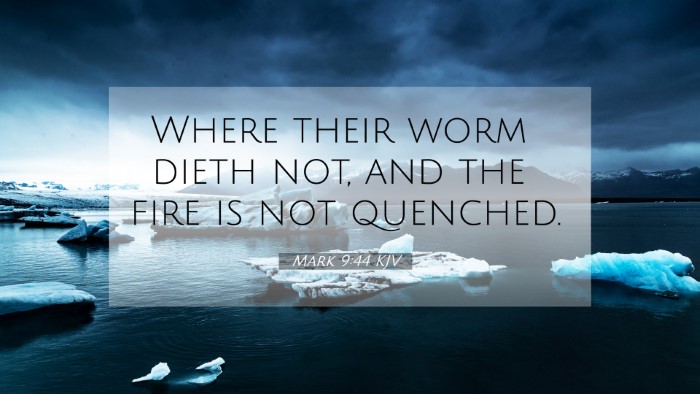Understanding Mark 9:44
Verse: Mark 9:44 - "Where their worm dieth not, and the fire is not quenched."
Summary of Meaning
Mark 9:44 is a stark warning about the consequences of sin and the eternal nature of damnation. This verse is part of a larger discourse by Jesus on the seriousness of sin and the lengths one should be willing to go to avoid it. The imagery of "the worm" and "the fire" conveys the torment and unending suffering faced by those who reject God's salvation.
Commentary Insights
-
Matthew Henry:
Henry emphasizes that the purpose of Jesus' words is to invoke a sense of urgency and importance regarding salvation. He explains that the reference to “the worm” suggests a continual state of decay and regret for those separated from God.
-
Albert Barnes:
Barnes underscores that this phrase denotes eternal punishment. He elaborates that the imagery represents the never-ending aspect of hell, where sinners bear the weight of their choices eternally, reminding believers of the need for diligence in their spiritual lives.
-
Adam Clarke:
Clarke provides a historical context, noting that the reference to “their worm” reflects the Jewish understanding of continuous decay and torment. He ties this into the overarching theme of Jesus’ ministry, which is about redemption and the serious repercussions of a life lived away from God.
Comparative Bible Verse Analysis
This verse aligns with several key themes found throughout Scripture. Below are cross-references that highlight the connections between biblical texts emphasizing eternal judgment and the consequences of sin:
- Isaiah 66:24: "And they shall go forth, and look upon the carcasses of the men that have transgressed against me: for their worm shall not die, neither shall their fire be quenched." - This verse directly parallels Mark 9:44, reinforcing the unending nature of punishment.
- Matthew 25:41: "Then shall he say also unto them on the left hand, Depart from me, ye cursed, into everlasting fire..." - The mention of everlasting fire connects the themes of judgment and eternal separation from God.
- Revelation 20:10: "And the devil that deceived them was cast into the lake of fire and brimstone..." - This verse depicts the ultimate fate of evil while echoing the imagery of eternal torment.
- Luke 12:5: "But I will forewarn you whom ye shall fear: Fear him, which after he hath killed hath power to cast into hell; yea, I say unto you, Fear him." - A warning about the seriousness of judgment reinforces the message of Mark 9:44.
- 2 Thessalonians 1:9: "Who shall be punished with everlasting destruction from the presence of the Lord, and from the glory of his power..." - This adds a New Testament perspective on eternal punishment.
- Jude 1:7: "...even as Sodom and Gomorrha, and the cities about them in like manner, giving themselves over to fornication, and going after strange flesh, are set forth for an example, suffering the vengeance of eternal fire." - Refers to historical judgment as a warning of future consequences.
- Mark 9:46: "Where their worm dieth not, and the fire is not quenched." - This verse provides additional emphasis on the torment mentioned in Mark 9:44, illustrating the relentless nature of hell.
Tools for Bible Cross-Referencing
Engaging with the Scriptures through cross-references enhances our understanding of themes. Here are some helpful resources:
- Bible concordance - A tool to find keywords and their occurrences throughout the Bible.
- Bible reference resources - These can assist in identifying verses that connect by thematic elements.
- Cross-reference Bible study guides - Helpful for deepening one's study of related verses.
- Comprehensive Bible cross-reference materials - Useful for finding intricate links across the entire Biblical text.
Links Between Old and New Testament
Mark 9:44 serves as an important link between the Old and New Testament views on divine judgment and the reality of hell. Through comparative studies, one can explore how themes of judgment evolve and resonate across both Testaments:
- Identifying parallels between prophetic warnings and Jesus' teachings.
- Comparative studies of Pauline epistles that echo themes of eternal consequence.
- Connecting teachings in the Prophets to Apostolic writings, drawing attention to consistency in God's message.
Interpreting Biblical Themes Through Cross-References
Understanding Mark 9:44 within the broader context of Scripture reveals significant insights regarding sin, judgment, and salvation. Cross-referencing these themes helps uncover the rich theological implications for believers today:
- How to find cross-references in the Bible through various methods and tools.
- Discovering similarities between consequential biblical texts and their teachings on morality and consequence.


